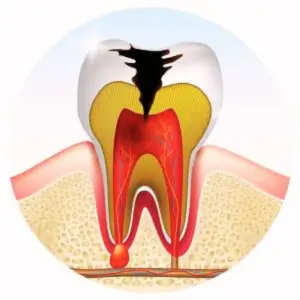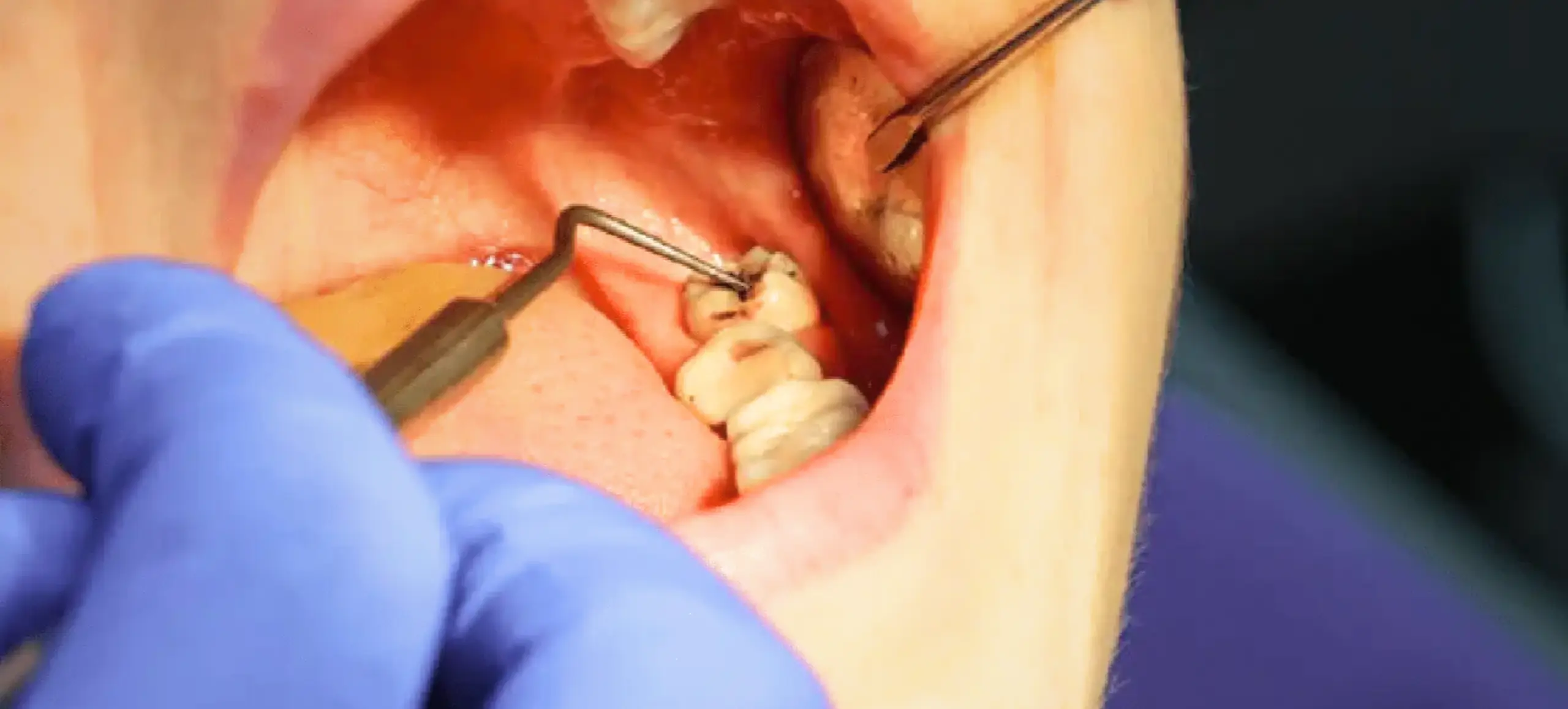Your wisdom teeth, those molars lurking at the back of your mouth, can sometimes be troublemakers. And if one of them develops a cavity, it can cause a whole new level of discomfort. But fret not! In this guide of your favorite dental blog, Daily Dentists, we’ll walk you through what you should do if your wisdom tooth has a cavity, ensuring you navigate this dental dilemma with ease.
What is a Wisdom Tooth Cavity?

First things first, let’s understand what we’re dealing with. A cavity in your wisdom tooth is essentially a hole or decay in the tooth caused by bacteria. Wisdom teeth, being the hardest to reach and clean, are particularly prone to cavities.
Cavity in Wisdom Tooth Symptoms
How do you know whether that nagging pain in your mouth is, in fact, a cavity in your wisdom tooth? You might want to look out for the following common symptoms as they might help you know and act appropriately on the matter:
Persistent Toothache: One of the most obvious signs of a cavity in your wisdom tooth is a persistent, throbbing toothache. This pain may come and go but tends to worsen over time, especially when you chew or apply pressure to the affected tooth.
Sensitivity to Hot or Cold Foods: If you wince in pain whenever you eat or drink something hot or cold, then you may be experiencing a cavity in your wisdom tooth. Tooth sensitivity happens when the decay reaches the inner layers of the tooth and exposes the sensitive nerve endings.
Pain When Chewing or Biting Down: Cavities weaken the structure of the tooth, making it more prone to pain and discomfort, especially when you chew or bite down on food. Sharp or shooting pains while eating may indicate a cavity in your wisdom tooth.
Swelling Around the Affected Area: There could be swelling around the gum line related to the area of the wisdom tooth, which is an indicator of dental problems, such as a cavity. Inflammation, redness, and sensitivity may characterize the swelling, pointing to infection or inflammation in that area due to the cavity.
Bad Breath or Foul Taste in the Mouth: Cavities trap food particles and cause bacteria to grow, developing into plaque and tartar, which can cause bad breath. Persistent bad breath or a foul taste should be investigated further if it remains present near the infected tooth.
Visible Holes or Dark Spots on the Tooth: In some cases, you may be able to see visible signs of decay on your wisdom tooth. This could include the presence of holes, pits, or dark spots on the surface of the tooth, indicating that decay has progressed to a more advanced stage.
What Should You Do?
Now that you suspect a cavity in your wisdom tooth, it is essential to take the right steps in addressing the issue promptly. Here’s an in-depth guide on what you should do to manage a cavity in your wisdom tooth effectively:
Schedule a Dental Appointment
Take your time about your dental health. Dial your dentist once you feel a cavity symptom in your wisdom tooth. Quick action will save the tooth from further deterioration in case it becomes worse due to the cavity.
Practice Thorough Oral Hygiene
While waiting for your dental appointment, maintain impeccable oral hygiene to prevent the cavity from progressing. Brush your teeth thoroughly at least twice a day using fluoride toothpaste. Also, it’s important to pay extra attention to the affected area as well. Floss daily to remove plaque and food debris from between your teeth and along the gum line.
Use Fluoride Mouthwash
Add fluoride mouthwash to your oral care routine. This will help to strengthen the enamel of your teeth and prevent the growth of cavity-causing bacteria. Swish the mouthwash around your mouth for at least 30 seconds to ensure it reaches the back of your mouth where your wisdom tooth is located.
Apply Dental Pain Relief Gel
Over-the-counter dental pain relief gels that contain benzocaine or clove oil can help reduce the discomfort associated with a wisdom tooth cavity for a short period. Use a small amount of gel and apply it directly to the affected tooth and surrounding gums according to the product’s instructions.
Use Ice Packs to Reduce Swelling
If you’re experiencing swelling or inflammation around your wisdom tooth, apply an ice pack or cold compress to the outside of your cheek for 15-20 minutes at a time. Cold therapy can help constrict blood vessels and reduce pain and swelling in the affected area.
Treatment Options
The dentist will evaluate the extent of the decay when it comes to treating a cavity in your wisdom tooth. Then, they will recommend the most appropriate treatment option to restore your oral health. Here is a detailed overview of the various treatment options available for addressing a wisdom tooth cavity:
Dental Fillings: When the cavities are small to moderate and not too deep within the tooth structure, your dentist would recommend a filling. Fillings restore the form, function, and strength of a tooth while avoiding further decay.
Inlays or Onlays: If the cavity is too large for a traditional filling but not extensive enough to require a full dental crown, your dentist might recommend inlay or onlay restoration. An inlay will fit within the cusps of the tooth, while an onlay is similar in design but covers one or more cusps.
Root Canal Therapy: If the decay has penetrated through to the innermost layer of the tooth, also known as pulp, it might cause inflammation and infection and very severe pain. A root canal is required to extract the infected or damaged pulp tissue in such situations.
Conclusion
It can be quite painful dealing with a cavity in your wisdom tooth, but the right steps can make a big difference in addressing the problem. Do not forget to make an appointment at the earliest possible time, maintain good oral hygiene, and adhere to the recommendations given by your dentist for treatment. With such proactive measures, you can protect your oral health and maintain that bright smile. So, if you feel a cavity in your wisdom tooth, do not wait; act today!
FAQs on Cavity in Wisdom Teeth
My wisdom tooth has a cavity, and it hurts. What should I do?
This calls for prompt response if you’re experiencing pain because of a cavity on the wisdom tooth. A dental appointment must be scheduled where the issue may be evaluated and treated. For now, just maintain good oral hygiene, and use fluoride mouthwash. It’s also safe to take some over-the-counter pain relief and ice packs if needed.
I have a cavity in my wisdom tooth, but it doesn’t hurt. Should I be concerned?
Even if your cavity in the wisdom tooth is painless, take care of it still. If ignored, cavities progress and may soon lead to more infections, further tooth decay, and even extraction in extreme cases. Consult your dentist for an examination and proper treatment.
What is better for a wisdom tooth cavity: filling or extraction?
The choice between filling and extraction depends on the severity of the cavity, the position of the wisdom tooth, and its overall health. If the tooth is functional and the cavity is manageable, a filling or other restorative treatment may suffice. However, if the tooth is impacted, difficult to clean, or causing recurring issues, your dentist might recommend extraction.
How much does a wisdom tooth filling cost?
The cost of filling a wisdom tooth varies with different factors, such as the size of the cavity and the material to be used in the filling. Your location is also a consideration. Fillings can range anywhere from $100 to $300 for each tooth on average. Seek an estimate directly from your dentist.
Can a cavity in a wisdom tooth heal on its own?
No, cavities cannot heal by themselves. Once a tooth has decayed, professional intervention is necessary to restore its structure and prevent further damage. Early treatment can save the tooth and reduce the risk of complications.
What are the symptoms of a cavity in a wisdom tooth?
The most common symptoms are persistent toothache, sensitivity to hot or cold, pain when chewing, visible holes or dark spots, swelling, and bad breath. If you notice any of these signs, consult your dentist.
Can a wisdom tooth cavity lead to infection?
Yes, untreated cavities in wisdom teeth can lead to infections, which may cause pain, swelling, and even abscesses. In severe cases, these infections can spread to other areas, leading to more serious health concerns.

